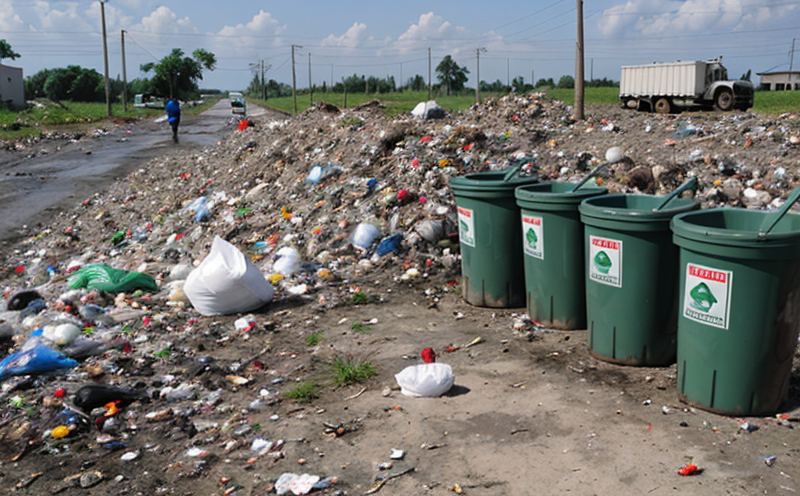ISO 16720 Pretreatment of Solid Waste Samples Test
The ISO 16720 standard provides a framework for pretreating solid waste samples to ensure accurate and reproducible results in subsequent analyses. This pre-treatment step is critical as it ensures that the chemical, physical, or biological characteristics of the sample are accurately represented before further testing.
According to ISO 16720, the pretreatment process involves several steps aimed at stabilizing the sample, minimizing variability, and ensuring that the sample remains representative. The primary goal is to ensure that any differences observed in subsequent tests can be attributed to true variations in the waste rather than procedural or environmental factors.
The standard covers a range of methods for pretreating solid waste samples depending on their composition and intended use. For instance, it may involve washing, drying, sieving, grinding, or other mechanical or chemical treatments as necessary. The specific treatment steps are determined by the nature of the waste and the subsequent analytical method to be used.
For example, if a sample is destined for leaching tests, it will require different pretreatment than one intended for microbiological analysis. This ensures that all samples are prepared in a manner that maintains their integrity and represents the true characteristics of the waste.
The ISO 16720 standard also emphasizes the importance of documenting every step of the pretreatment process. This documentation is crucial for ensuring traceability, compliance with regulatory requirements, and reproducibility of results across different laboratories.
Implementing this pre-treatment ensures that the subsequent tests are more reliable and accurate. By carefully preparing samples in accordance with ISO 16720 guidelines, laboratories can reduce variability, enhance reproducibility, and improve the overall quality of waste management decisions based on test results.
The standard is widely recognized for its robustness and reliability, making it a preferred choice by regulatory bodies, environmental agencies, and private companies involved in solid waste management. Compliance with ISO 16720 not only ensures accurate testing but also enhances the credibility and acceptance of results across different jurisdictions.
In conclusion, adhering to the ISO 16720 standard for pretreating solid waste samples is essential for ensuring that subsequent tests yield reliable, reproducible, and actionable data. This process plays a crucial role in the effective management and disposal of solid waste, contributing significantly to environmental protection and sustainability.
Why It Matters
The ISO 16720 pretreatment procedure is fundamental for several reasons:
Precision and Reliability: Proper pretreatment ensures that the samples accurately represent their true characteristics. This precision is crucial in environmental testing, especially when regulatory compliance or public health is at stake.
Regulatory Compliance: Adhering to ISO 16720 helps laboratories meet stringent regulatory requirements set by various governmental and international bodies. This ensures that the results are acceptable and can be used as a basis for decision-making.
Enhanced Reproducibility: The standardized approach in pretreatment minimizes variability, ensuring consistent test outcomes across different laboratories. This is particularly important when comparing data from various sources or conducting inter-laboratory studies.
Informed Decision-Making: Reliable and accurate testing results enable informed decisions regarding waste management practices, recycling strategies, and pollution control measures. This can lead to more effective environmental policies and better resource utilization.
Improved Credibility: By adhering to an internationally recognized standard like ISO 16720, laboratories enhance the credibility of their testing results. This is essential for building trust with stakeholders and ensuring that the findings are widely accepted.
The implementation of ISO 16720 ensures that every step in sample preparation is documented meticulously. This not only improves the quality of test outcomes but also facilitates audits, reviews, and improvements within the laboratory processes.
Benefits
Implementing ISO 16720 pretreatment procedures offers numerous benefits:
Enhanced Accuracy: By ensuring that samples are prepared in a standardized manner, ISO 16720 minimizes errors and inconsistencies. This leads to more accurate test results, which is crucial for making informed decisions.
Cost Efficiency: The standardization of pretreatment processes can lead to cost savings by reducing the need for repeated tests due to sample variability or procedural errors.
Improved Quality Control: ISO 16720 promotes a culture of quality control within laboratories. By adhering to these guidelines, laboratories can maintain high standards and improve overall performance.
Better Environmental Outcomes: Accurate testing results contribute to more effective waste management practices, leading to better environmental outcomes. This is particularly important in the context of sustainable development goals.
Increased Credibility: Laboratories that adhere to ISO 16720 are seen as more credible and reliable. This can enhance their reputation and attract more clients or partners.
The standard also facilitates better collaboration between different stakeholders, including regulatory bodies, environmental agencies, and private companies. By using a standardized approach, all parties involved in solid waste management can work towards common goals with greater effectiveness.
International Acceptance and Recognition
ISO 16720 is widely recognized and accepted across the globe for its comprehensive approach to pretreating solid waste samples. This standard has gained significant traction due to its robustness and reliability, making it a preferred choice by various stakeholders.
Regulatory Bodies: Many regulatory bodies have adopted ISO 16720 as part of their official guidelines. This includes national environmental agencies and international organizations such as the United Nations Environment Programme (UNEP).
Environmental Agencies: Environmental agencies around the world rely on ISO 16720 to ensure that testing results are accurate, reproducible, and reliable. This helps in making informed decisions regarding waste management practices.
Private Companies: Numerous private companies involved in solid waste management also use ISO 16720 to maintain high standards of quality control and ensure compliance with regulatory requirements.
The widespread acceptance of ISO 16720 underscores its importance in the field of environmental testing. It ensures that all stakeholders can rely on consistent, accurate, and reproducible results, thereby fostering trust and collaboration across different sectors.





